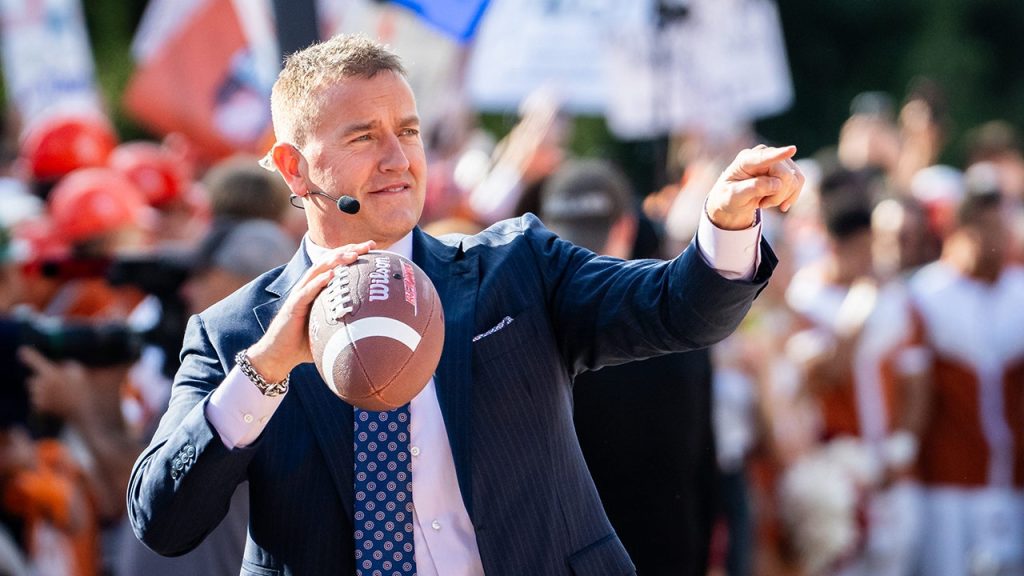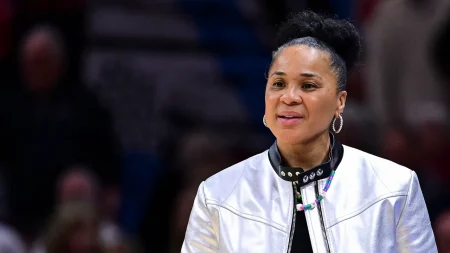Kirk Herbstreit, a prominent ESPN college football analyst, has voiced strong opinions regarding the recent spate of brawls that erupted during college football games over the weekend. Specifically, he is concerned about the fights that occurred when players attempted to plant flags on opposing teams’ fields as a display of rivalry or dominance. Notably, at least three games witnessed such altercations, including one during the Arizona State vs. Arizona matchup, where Sun Devils players tried to place a pitchfork symbol at midfield. In light of these incidents, which indicate a concerning trend in player conduct, Herbstreit has called for more severe penalties to be imposed on the players involved, suggesting that mere fines issued by conferences are insufficient to deter this behavior.
The Big Ten Conference has taken initial action by imposing fines of $100,000 each on Michigan and Ohio State following their involvement in postgame brawls. However, Herbstreit argues that financial penalties are not enough, as the lack of significant consequences for the players may fail to instill a sense of accountability. In a message posted on X, he emphasized the importance of conference commissioners thoroughly reviewing footage from these brawls and taking decisive action. He advocates for suspensions for any players who exacerbated the situation, upholding the idea that those responsible for escalating tensions should face stringent repercussions, such as missing their next game, which could potentially include vital matches such as bowl games or playoff appearances.
This sentiment of accountability is underscored by the fact that the recent fights were not isolated incidents, as separate brawls also broke out between players from North Carolina and NC State, as well as between Florida and Florida State. Each incident highlights a worrying trend of violence and unsportsmanlike behavior that could tarnish the integrity of college football. Herbstreit’s call for suspensions reflects a growing concern among analysts and fans alike, who believe that such disruptions undermine the values and sportsmanship that should be foundational to college athletics.
As the discussion moves forward, the consequences for players’ actions during these brawls could have significant ramifications, especially for teams involved in postseason activities. As it stands, Arizona and Florida State are the only teams among those affected that lack the requisite six wins for bowl game eligibility. This situation raises further questions about whether conferences will implement consistent disciplinary measures across their teams and how these decisions might impact the competitive landscape of college football. In the wake of these incidents, many are left wondering how to balance the entertainment value of college football rivalries with the need for player safety and fair competition.
Despite the enactment of fines by the Big Ten, the reactions from other conferences remain unclear. With Herbstreit urging not just disciplinary actions but a reaffirmation of sportsmanship values in college football, it remains to be seen how other conferences will respond to the growing concern over on-field conduct. The general consensus among fans and analysts is that stronger repercussions could serve as a deterrent to future brawls and encourage a culture of respect and integrity within the sport. Without such measures, there is a risk that the competitive spirit can devolve into chaos, which can harm the reputation of the league and the positive experiences for all participants.
In conclusion, the series of brawls over the weekend has sparked a robust debate about player accountability and the role of conference authorities in maintaining sportsmanship in college football. Kirk Herbstreit’s call for harsher punishments, including player suspensions, highlights an urgent need for reforms that address the issues of player conduct and promote a healthier competitive environment. As the scrutiny increases, it will be crucial for conference officials, coaches, and players to navigate this dilemma carefully, recognizing the responsibilities that come with representing their institutions and the broader implications for the sport as a whole. Only through effective action can the essence of college football – as a celebration of talent, teamwork, and sportsmanship – be preserved for future generations.










